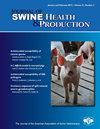钝爪修剪与功能性爪修剪对母猪步态影响的比较
IF 0.7
4区 农林科学
Q3 Agricultural and Biological Sciences
引用次数: 1
摘要
目的:比较功能性剪爪与钝性剪爪对母猪步态的影响。材料和方法:将19头母猪(PIC C29)运送到研究中心,在8天的时间内修剪3次爪子。在第一天,狼爪被修剪得与蹄的冠状带一样整齐。第4天进行钝性修剪,第8天进行功能性修剪。在每次修剪之前记录每头母猪的步态,以比较先前修剪的效果。在第12天进行最后一次步态记录。从母猪身上收集的步态数据在几天内进行比较,以确定是否发生了任何变化。结果:在去爪后,步态数据有了积极的改善。速度(P = .03)、步幅(P = .02)、步幅持续时间(P = .04)、站姿(P = .04)和后站姿百分比(P = .03)发生了变化。钝修剪抵消了修剪爪所获得的改善,从后排姿态百分比(P = 0.02)和前摆(P = 0.04)的变化中可以看出。功能性修剪增加了修剪爪所观察到的改善。在站位(P < 0.001)、站位百分比(P < 0.001)、步幅持续时间(P = 0.003)、步幅长度(P = 0.008)和速度(P = 0.003)方面观察到变化。意义:修剪爪和功能性修剪爪改善了母猪的步态。钝修剪不提供相同的好处观察到修剪dewclaws或功能修剪爪子。本文章由计算机程序翻译,如有差异,请以英文原文为准。
Comparison of blunt versus functional claw trimming effects on sow gait
Objective: To determine the effect of functional claw trimming versus blunt claw trimming on the gait of sows. Materials and methods: Nineteen sows (PIC C29) were transported to the research center and claws were trimmed 3 times over an 8-day period. Dewclaws were trimmed even with the coronary band of the hoof on day 1. Claws were blunt trimmed on day 4 and functional trimming occurred on day 8. The gait of each sow was recorded prior to each trimming to compare the effect of the previous trimming. A final gait recording was taken on day 12. The gait data collected from the sows was compared across days to determine if any changes occurred. Results: Positive improvements in gait data were noted after dewclaw trimming. Changes were seen in velocity (P = .03), stride length (P = .02), stride duration (P = .04), stance (P = .04), and rear percent stance (P = .03). Blunt trimming offset the improvement gained by trimming dewclaws, seen in the changes to rear percent stance (P = .02) and front swing (P = .04). Functional trimming increased the improvement observed by trimming dewclaws. Changes were seen in the stance (P < .001), percent stance (P < .001), stride duration (P = .003), stride length (P = .008), and velocity (P = .003). Implications: Trimming dewclaws and functionally trimming claws improved the sow’s gait. Blunt trimming did not provide the same benefits observed by trimming dewclaws or functionally trimming the claws.
求助全文
通过发布文献求助,成功后即可免费获取论文全文。
去求助
来源期刊
CiteScore
1.80
自引率
0.00%
发文量
29
审稿时长
>36 weeks
期刊介绍:
The Journal of Swine Health & Production (JSHAP) is an open-access and peer-reviewed journal published by the American Association of Swine Veterinarians (AASV) since 1993. The aim of the journal is the timely publication of peer-reviewed papers with a scope that encompasses the many domains of applied swine health and production, including the diagnosis, treatment, management, prevention and eradication of swine diseases, welfare & behavior, nutrition, public health, epidemiology, food safety, biosecurity, pharmaceuticals, antimicrobial use and resistance, reproduction, growth, systems flow, economics, and facility design. The journal provides a platform for researchers, veterinary practitioners, academics, and students to share their work with an international audience. The journal publishes information that contains an applied and practical focus and presents scientific information that is accessible to the busy veterinary practitioner as well as to the research and academic community. Hence, manuscripts with an applied focus are considered for publication, and the journal publishes original research, brief communications, case reports/series, literature reviews, commentaries, diagnostic notes, production tools, and practice tips. All manuscripts submitted to the Journal of Swine Health & Production are peer-reviewed.

 求助内容:
求助内容: 应助结果提醒方式:
应助结果提醒方式:


